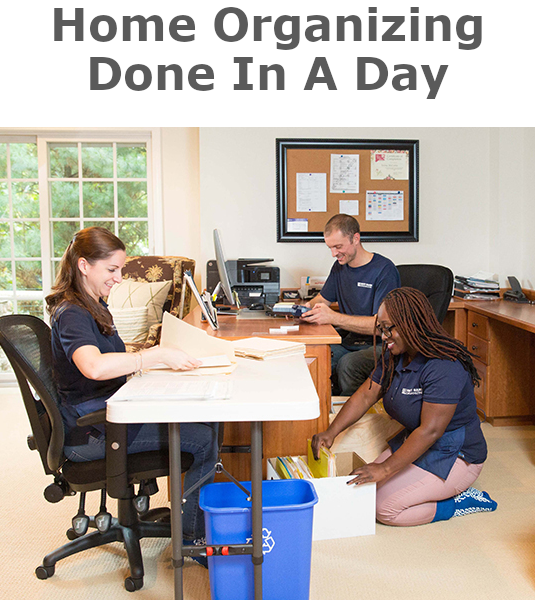Right now is the perfect time to prioritize and organize for 2021. Organizing your time is like organizing your space. Here’s why and 5 tips to prioritize and organize in 2021.
If you’ve worked with us, you know that I always insist on clarifying your top organizing priority. You may have many reasons to get organized, but we can’t get started until you choose your top one. Why? Because getting organized demands tremendous focus. You may have a general idea of why you want to get organized, but that’s not enough. With just a general idea you may be able to purge some items, but then you hit a wall.
What happens? You do great with the unimportant stuff, but you slow down with the less important stuff. You may know you have too many keepsakes, but you also know they are unique and irreplaceable. Or maybe you may have items you are no longer using, but are too valuable to just donate.
The answer is to prioritize first, so that you have a positive goal pulling you forward. Pushing yourself to edit things in your space will only get you so far. You need that positive goal to pull you forward, when you hit that wall. For example, maybe your positive goal is clearing out an extra room for a nursery. In that room is a treadmill, that you are mostly using to dry laundry on. You bought the treadmill with best intentions, but no one has used it in years. It’s hard to let it go because you spent a lot of money on it. However, the positive goal of creating a nursery pulls you forward, where you might otherwise stall. You realize that the value of the space left behind, is greater than the treadmill itself.
This approach for organizing your space is the same as organizing your time. You need to prioritize before you organize. Here are five tips on how to organize your goals:
1. Be realistic
Don’t try to “fix” everything in one year! When you start thinking about all the things you’d like to do in the new year, watch out. You may overdo it. Just as with space, your time is limited. Getting organized is not about finding ways to fit everything in. It’s about how fit your top priorities in.
Also, once you have narrowed down your top goals, be realistic about the workload. Let’s say a top goal is to lose weight. It’s not realistic to think that you will suddenly go to the gym 7 days a week. It’s not realistic to think you will suddenly drop all of your favorite foods. The danger of unrealistic goals is that you increase the chance of failure. That in turn makes it more difficult to take on an important goal next time.
2. Park it in 2022
When determining your top goals for 2021, ask yourself if can park the less important goals in 2022. The hardest part of prioritizing isn’t recognizing the things that are important. The hardest part is recognizing the things that are less important. Some priorities will jump out as purely unimportant. They’re harder to recognize than the most important, but it’s the less important priorities that are really tough.
With any luck 2021 is not you last chance to accomplish big goals. Are there some goals that you could you park on a 2022 list? If you can take these goals off you 2021 list then you free up calendar space to focus. If you can focus enough to complete your 2021 priorities then you may finish early. Perhaps then you can look at what you have parked on your 2022 list.
3. Choose a word
If you don’t like the idea of New Year’s resolutions, try choosing a word for the year. Boiling a year down to one word, really helps you focus. I’ve been trying this for the last two years. In 2019 my word was “publish” and in October 2019 I published my first book. (Don’t be that impressed. I was working on it for 6 years.) For 2020 my word was “health.” That turned out to be a good choice during a pandemic.
If choosing one word for a year sounds like a good idea, but difficult, I have a recommendation. Read Essentialism: The Disciplined Pursuit of Less by Greg McKeown. It not only helps you focus on less, but helps complete your limited goals more successfully. It’s one of the most helpful books I have ever read.
4. Be specific
“Be specific” is related to the “be realistic” tip above. Picking up from the example I used under be realistic here’s how to be specific. If you have limited your goal to “get healthy,” now is the time to be specific about it. Saying you will try to eat better and exercise won’t get you far.
Being realistic and specific, you might choose to try a new healthy recipe every Sunday afternoon. This allows time for new shopping habits and new cooking skills. Perhaps you do a cardio workout every Monday, Wednesday, and Friday 6:30-7:30 before work. Those might sound like small goals, but you are more likely to accomplish them. Then when you do, guess what? You’ll feel great! Then you will be more inspired to take on bigger goals.
5. Time blocking
Time blocking works well for both new habits and new goals. It simply means that you dedicate certain spots in your schedule to an activity. It is very important to be realistic with this too. There is almost no activity to which you can devote an entire day or even a half day. Avoid time blocking a challenging activity right after you get home from work. Your 6:30-7:00 workout on the other hand is a realistic time block, because it fits in before work.
You may want to develop a habit that is not part of bigger goal. Maybe you just want to find time to read more. If reading puts you to sleep then after work is not a good time. If it energize you then it is. I find Sunday morning to be a pretty reliable time for reading. Once you enter a time block on your calendar, try it out. If you find you are just not able to stick to it, then feel free to adjust. That’s a very important part of time blocking. It should not be about being rigid. These regular spots in your schedule should be helping you meet your goals.
If they aren’t working for you, first try readjusting, then prepare to look at alternatives. One alternative is to reassess your other priorities. Are you spending too much time working on the weekends? Too much time commuting? Too much time watching TV? The other alternative is maybe you don’t want to take on this new habit/goal as much as you thought.
Time blocking works best when it can safely limit your tasks. You may be suddenly overwhelmed with things you need to make a point of doing. However, when you realize that you can safely park a couple of tasks in you time blocks it’s wonderful. You can take a breath and focus on the most urgent remaining tasks. For example, if a bill comes in, you don’t have to worry about paying it now. Why? Because you will pay it in your bill paying time block. Got something you’d like to study? Reserve it for your education time block.
* * *
In recent years, I have noticed a growing backlash to the idea of New Year’s resolutions. There seems to be two reasons this backlash. The first is that people don’t like the idea of setting themselves up for failure. It’s true that the statistics on successful New Year’s resolutions are not good. However, I hope these tips will make keeping New Years resolutions more manageable and reliable.
Here’s the second reason for the backlash. People don’t like the idea of being obligated to change based on the tick of a clock. My argument would be twofold. First, if you are completely content with your life, there is no obligation to change. Second, if you would like to make a change, what better occasion is there?
Please Share With Your Community
















